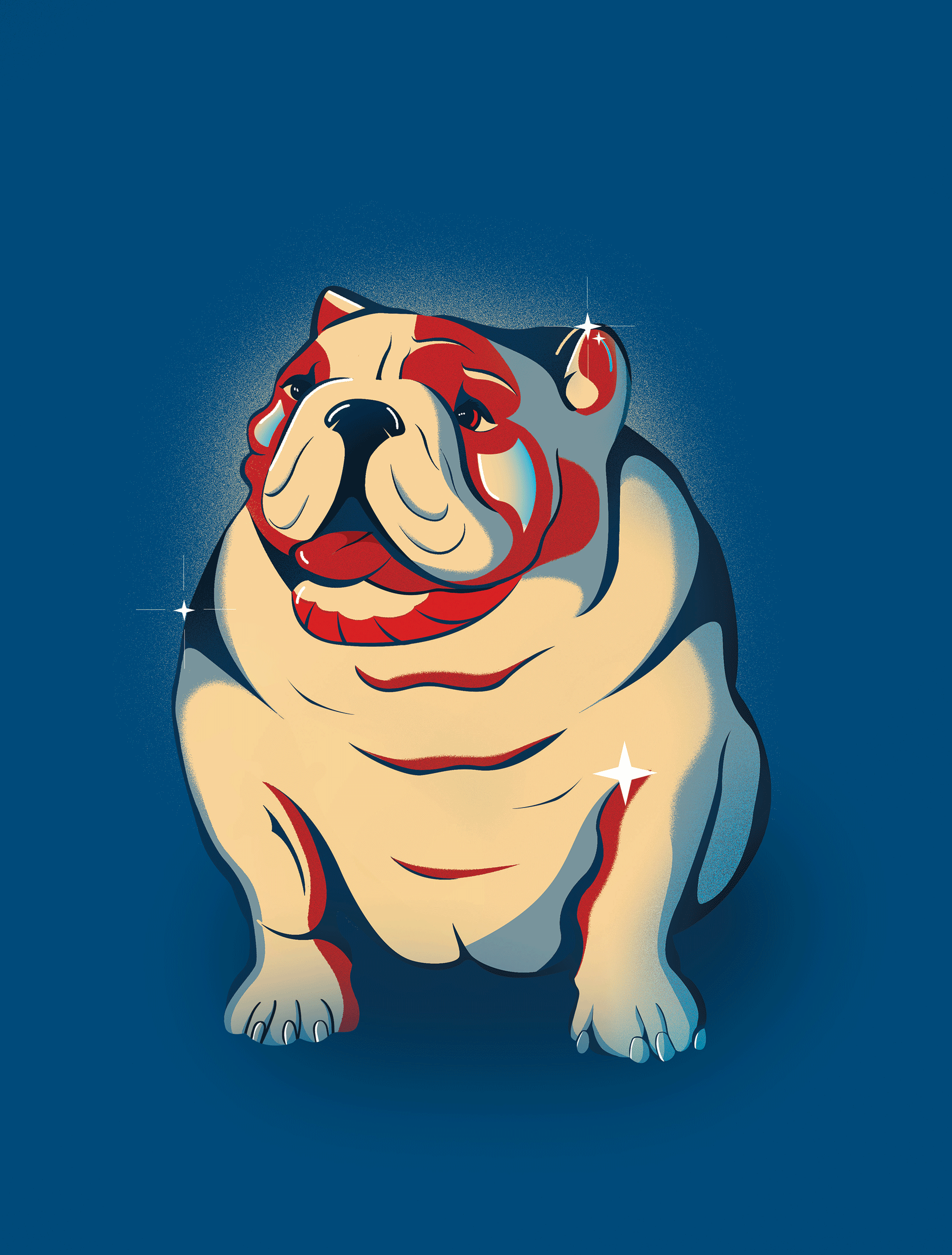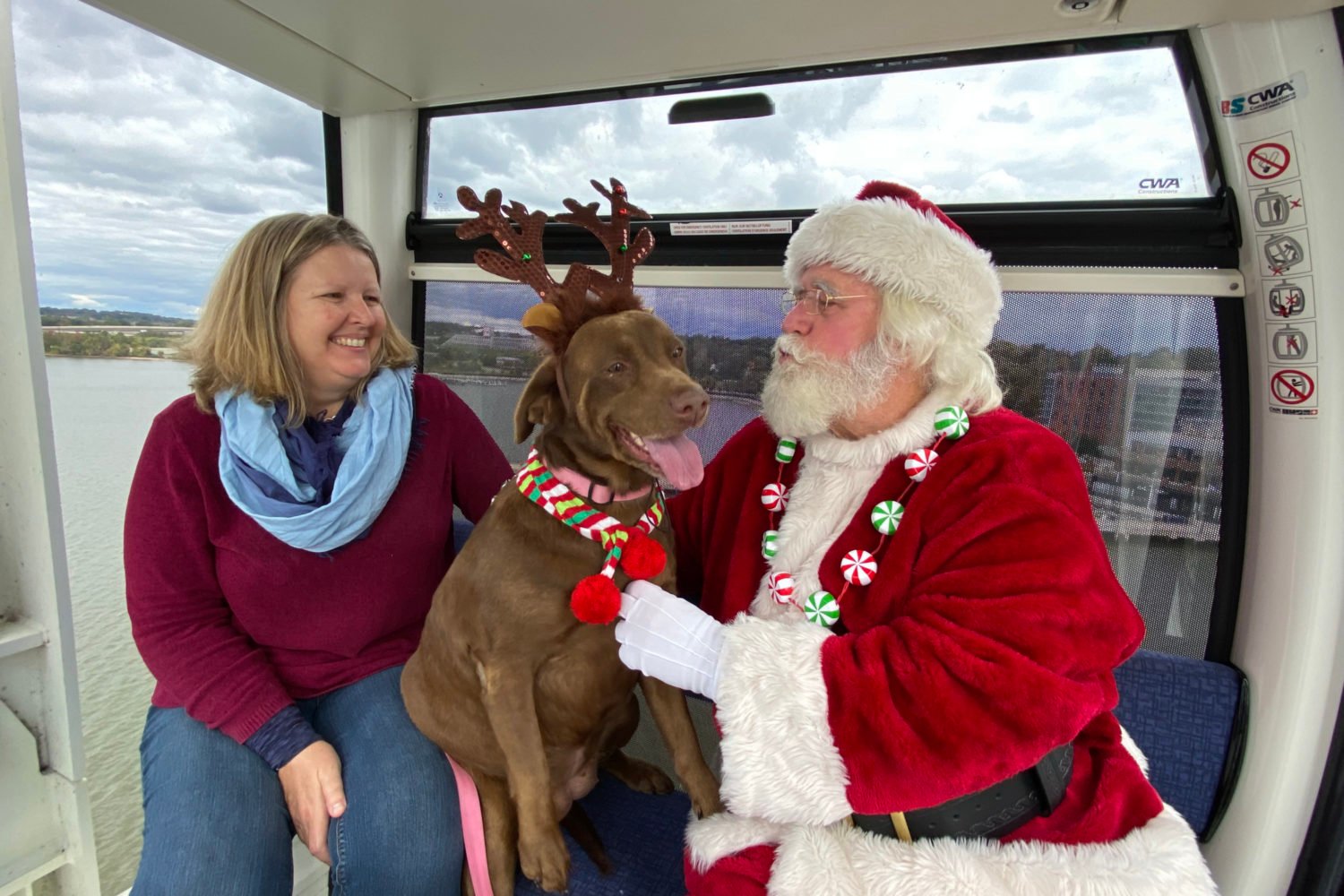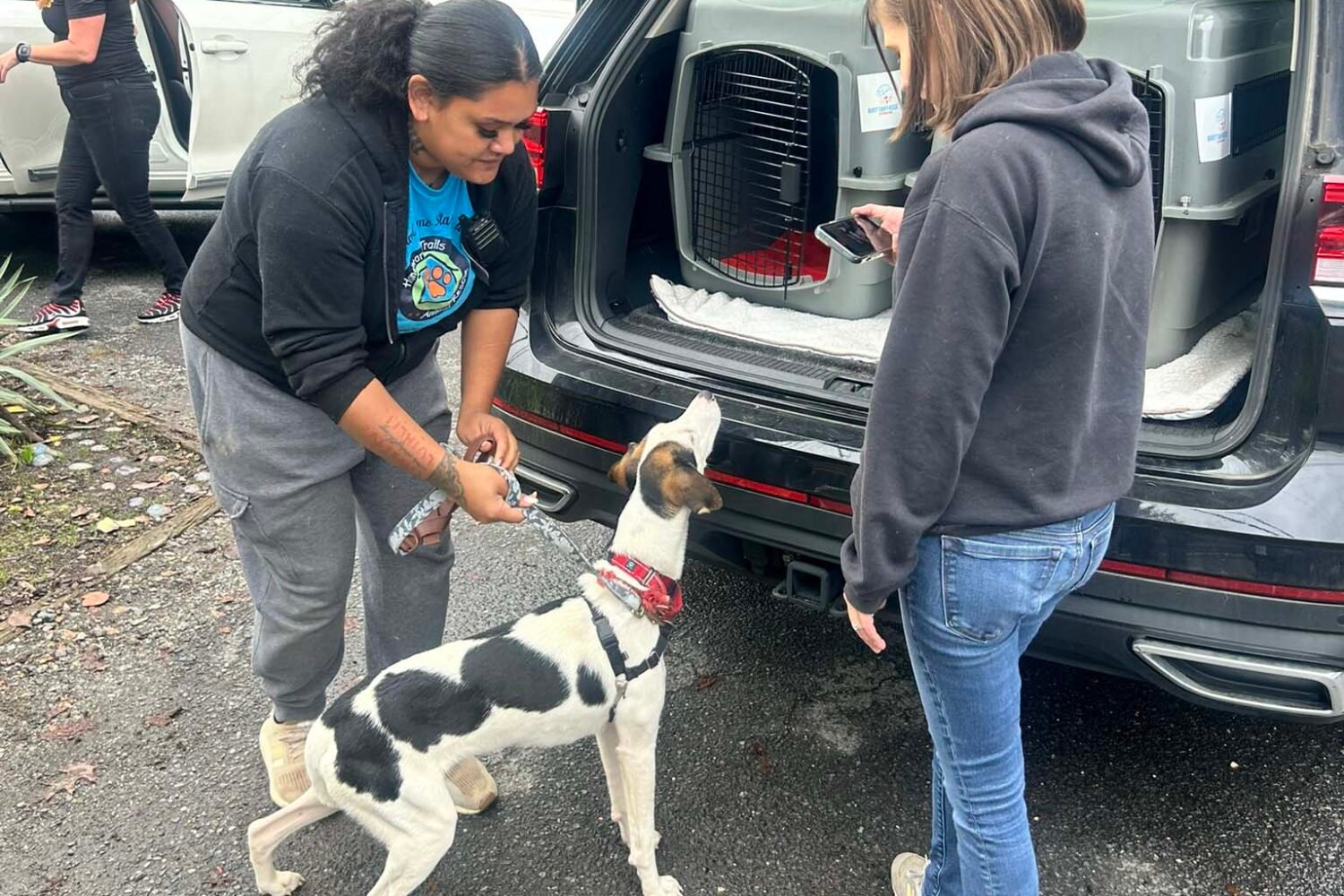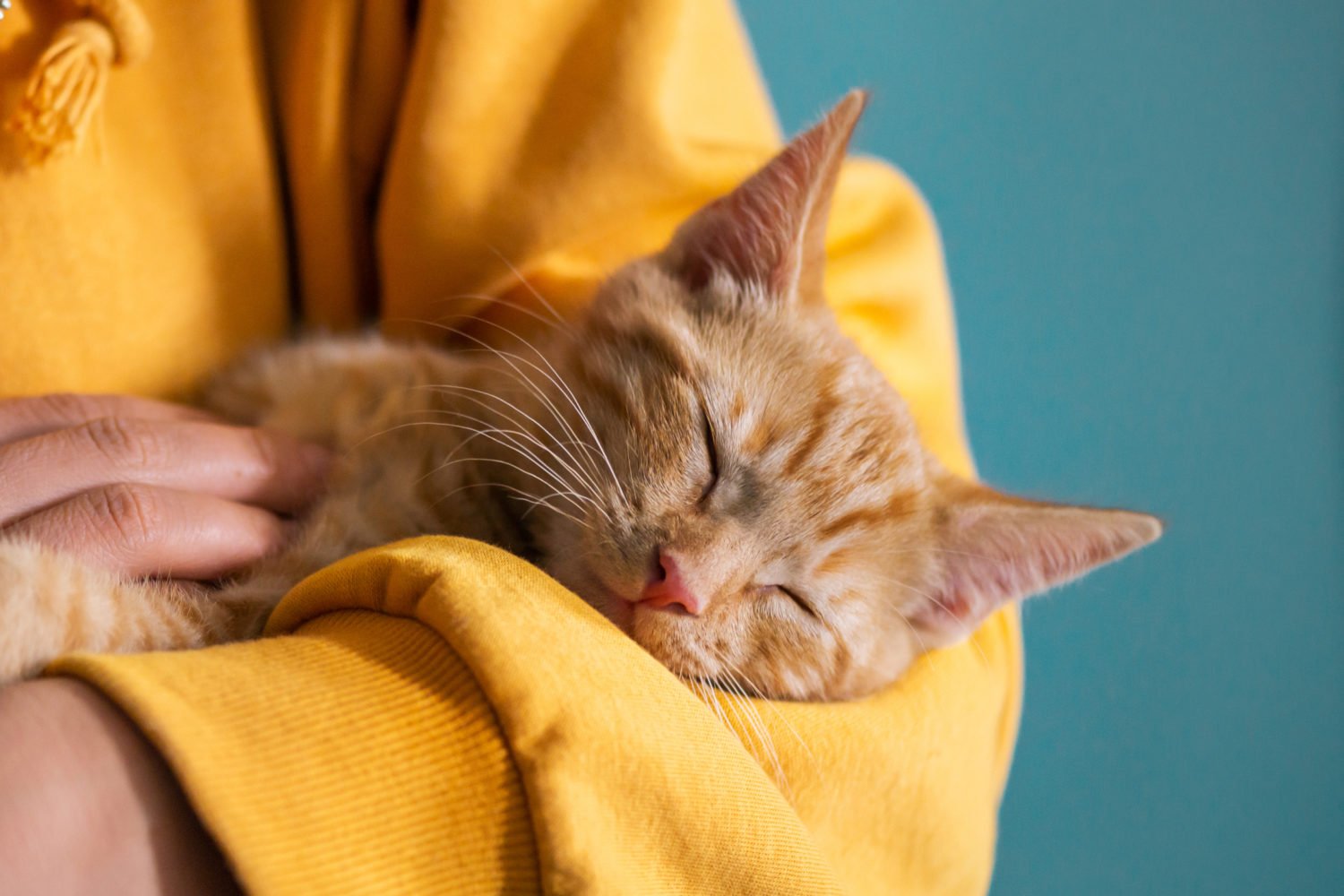On a warm evening in May, as the polls closed in the West Virginia Senate primary, Jim Justice was holding court at the governor’s mansion. Lounging in a green leather armchair, the state’s Republican governor—a folksy coal baron of notable stature: six foot seven, three-or-so-hundred pounds—snacked on shrimp and fried chicken while staffers and friends compulsively refreshed election returns on their phones.
On the mansion’s rear patio, the press corps had assembled. A dozen reporters clutched notebooks and laptops, awaiting their audience with the governor, who was almost certain to become a US senator in the fall. These journalists cover vital issues—the crisis in the state’s foster-care system, the dearth of correctional employees—and that night, they planned to ask about the weight of this primary election. Its winner would likely flip Joe Manchin’s seat, tilting the Senate closer to Republican control.
While the other reporters stood on the porch, prepping for their 15 minutes with the governor, I felt a little chagrined. There I was, inside the mansion, sprawled atop a plush carpet emblazoned with the seal of West Virginia, rubbing Jim Justice’s dog.
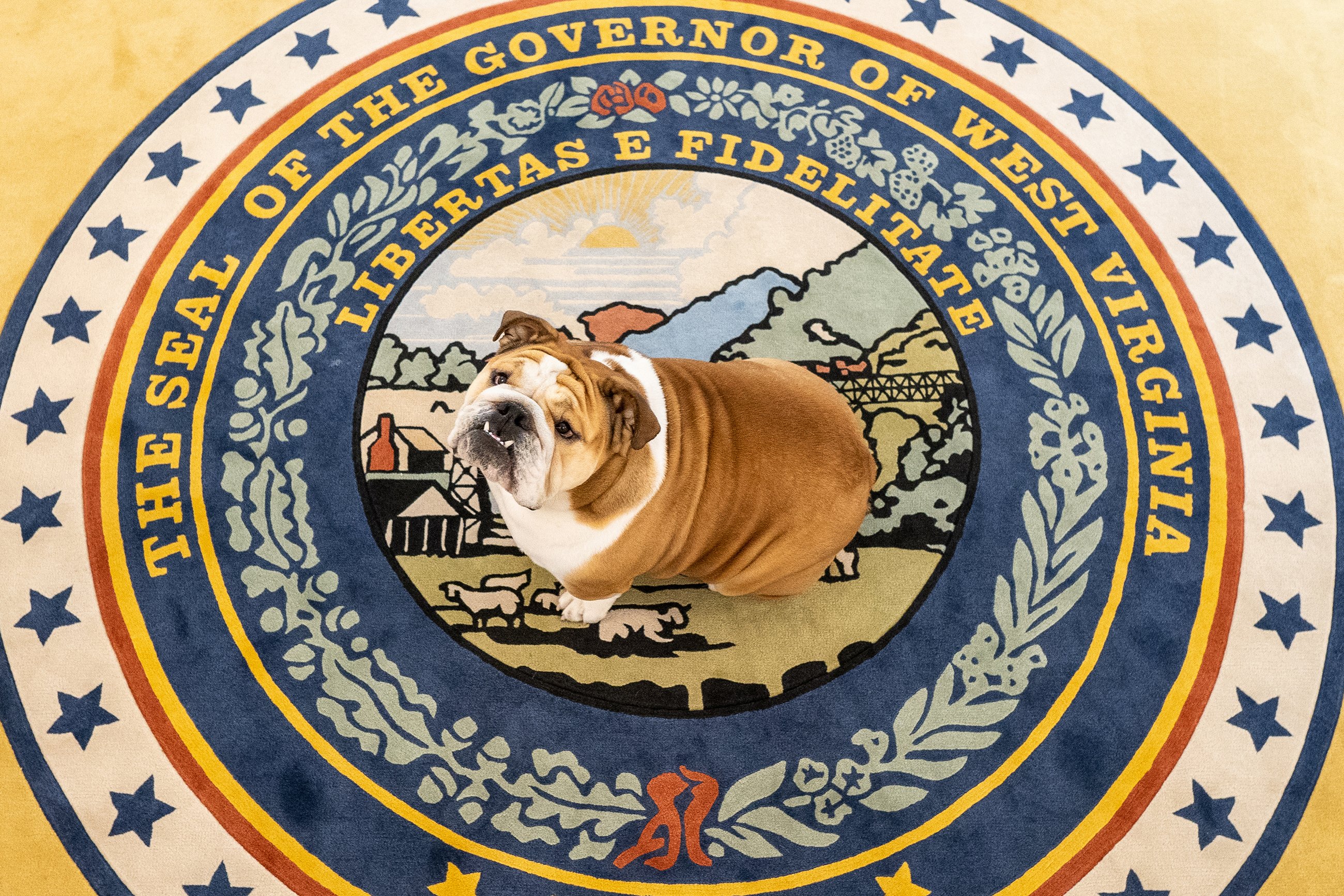
“She’s a good girl, isn’t she?” the governor mused, peering down at me from his chair.
“She’s so good,” I said. “Is she trained?”
“No, never trained her a day.”
“She doesn’t sit? Doesn’t do paw or anything?”
“Doesn’t do it.”
“Like, if you tell her to sit, she won’t?”
“Well, she may if you’ve got some food.”
The creature beneath my hands was Babydog, a four-year-old English bulldog, 62 pounds, soft and hefty with rolls of fat that glide atop her body when she moves. She’s sunny and affable. Quiet. Sweet. Perhaps the greatest retail politician West Virginia has ever known.
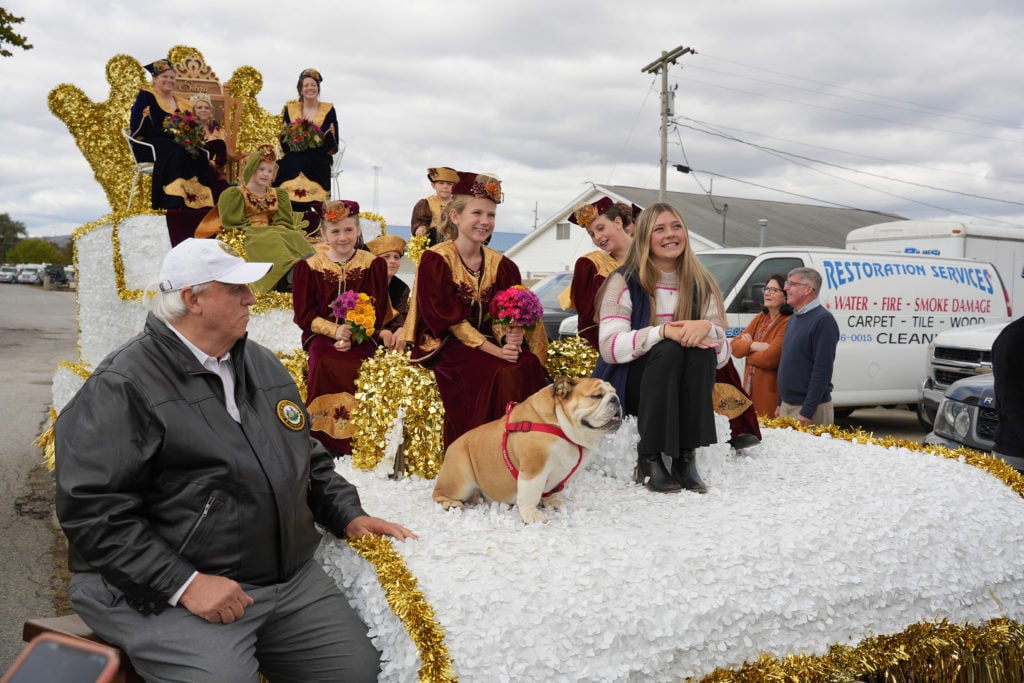
It’s silly, I know, that I’d traveled nine hours by train—through soft hills and foggy mountains—simply to meet this dog. But Babydog is not like other political pets; she’s not a vague yet humanizing presence, rolled out once a year for a holiday card. She’s almost always at the governor’s side. Babydog rides shotgun in his black Suburban, traversing the state for groundbreakings, bill signings, ribbon cuttings, and press conferences. Steelworkers line up for selfies with her. Schoolchildren shriek when she trots onto the floor of their gyms. Babydog is herself a public figure. She has her own political brand.
In preparation to meet Babydog, I’d spoken to a motley crew of West Virginians—a handful of political operatives, the employees of Babydog’s favorite Wendy’s, a pollster, a statehouse reporter, and an assemblage of voters—trying to discern her meaning to the state. She’s like West Virginia’s mascot, they said, a “homegrown celebrity” but also a “prop.” She’s a “part of the governor’s persona,” his “secret sauce,” and “quite possibly the most popular political figure in West Virginia.” “If anybody’s star power is greater than Governor Justice’s,” someone said, “it’s his dog.”
I also heard grumbling, particularly from Justice’s opponents. “The governor has a very cute dog. Everybody loves the dog,” said Mike Pushkin, the chair of the West Virginia Democratic Party. “But he uses that to distract from the fact that he’s not a very good governor.” Some think he’s deflecting from his personal problems, too. Justice’s business empire—with holdings in coal, agriculture, and hospitality—has been embroiled in disputes over hundreds of millions of dollars of debt. Since last summer, the governor’s state wages have been garnished, a helicopter owned by one of his companies was seized, and pieces of his property were auctioned in courthouses around the state. The Greenbrier, Justice’s historic mountain resort, owes his own state government millions in sales tax.
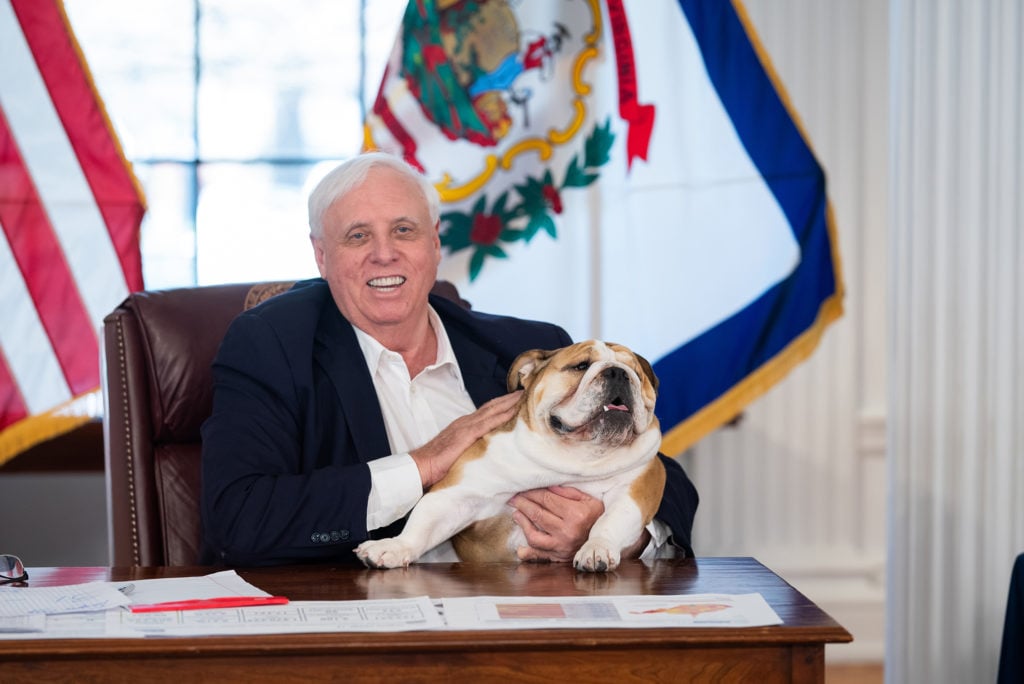
“These are the kinds of stories that in the past would have sunk a governor, but he manages to remain relatively unscathed by them,” one Democratic operative complained. Another said, “We have major problems in the state of West Virginia. But the governor trots out a very cute dog and people just seem to forget about all that.”
Indeed, on primary night, Justice cruised to victory. I was on the floor, scratching Babydog’s feather-soft ears, when a huge monitor in the corner of the library flashed a tweet: The AP had called the race, only about 45 minutes after the close of polls. “Jim,” a family friend said, pointing at the screen. “Jim!” she called out louder, and the governor silently beamed, looking unsurprised.
A few moments later, a state trooper in a gray checked suit grasped Justice’s hand. “One, two, three,” the men counted, and the trooper heaved the governor from the armchair. Upright, he achieved a fearsome height. “I’ve got to go see the press now,” Justice murmured to the gaggle of staffers who’d engulfed him, before ambling from the library into the hall.
“Jim, Baby’s following you,” Justice’s wife, Cathy, called after him—and sure enough, Babydog had scrambled to her feet. She trotted after the governor, tailing him through the hallway and by the bar. As she passed, people turned their heads, clucking and cooing, snapping pictures of her with their phones. She didn’t stop. She wasn’t distracted. Babydog was headed to work.
On Christmas Eve in 2019, the governor’s kids gave him a bulldog. “We had a grandson,” Justice explained to me. “He’d just turned two, he was talking pretty good, but he had no earthly idea what the word ‘puppy’ meant.” Apparently, this child watched the little dog amble under the tree, around the presents, then lost sight of her and cried, “Where’d that babydog go?”
“I knew right then,” Justice recalled. “I said, we’re gonna name her ‘Babydog.’ ”
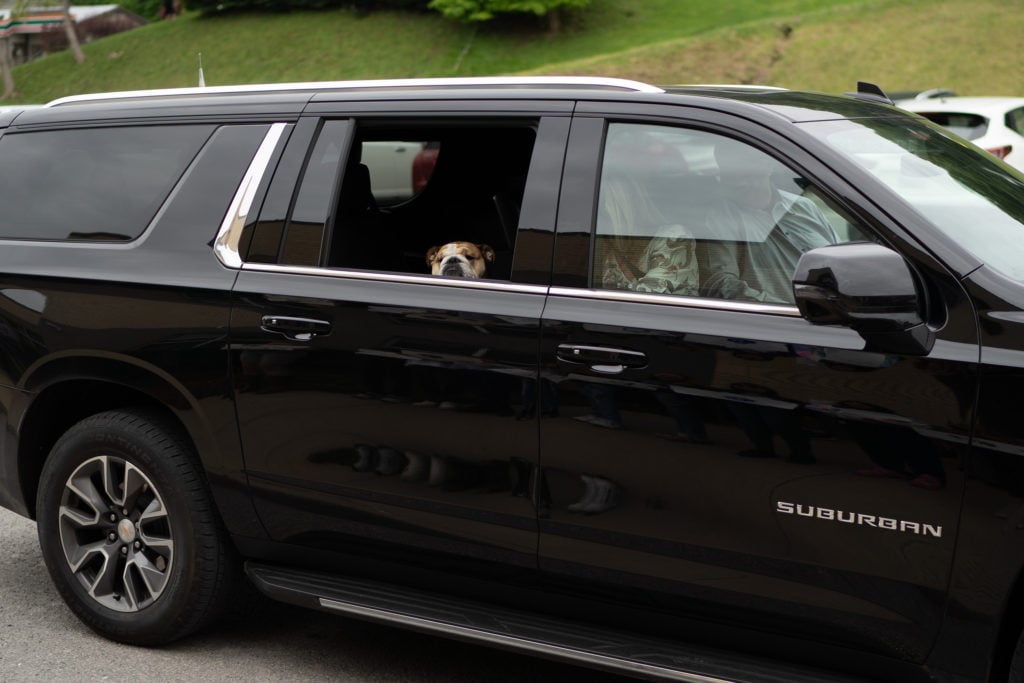
At that point, Justice insists, there was “surely no grand plan” to roll his puppy out for the public. But during the early pandemic, as she tottered around the house, he grew to like her company and began to sporadically bring her to work. In early 2021, she mugged for the cameras at his second inauguration. A few weeks later, she appeared at his daily Covid briefing to predict the score of the Super Bowl. During a May heat wave, the governor’s office tweeted a picture of her wrinkly face grinning beneath a wet towel, urging West Virginians to stay cool. The public seemed to like her—a winsome young bulldog bringing levity in a difficult time—so when the governor needed to plug the new Covid vaccines, she was a natural asset to deploy.
In June 2021, Justice announced the “Do It for Babydog’’ vaccine sweepstakes. Folks who got their shots would be entered to win prizes like trucks, hunting rifles, college scholarships, and lifetime fishing licenses. During the governor’s daily briefing, a trooper dropped Babydog into his lap, and he grabbed her paw and waggled it at the camera. “Look at this darling little face here,” he said. “You can’t possibly turn her down.” By and large, West Virginians did not do it for Babydog—the state’s vaccine rate was low—but the campaign did build Babydog’s brand, making her something of a folk hero in the state.
Prior to Babydog’s fortuitous arrival, Justice’s popularity had been in a slump. In 2016, he’d been elected as a Democrat, but nine months later, he took the stage at a Trump rally to publicly defect to the GOP. Democrats were apoplectic, Republicans mistrustful. For a few years, his job approval flagged. It wasn’t Babydog that fixed it—the pandemic, not to be crass, was a ratings bonanza for governors—but the dog certainly greased his ascent. Emerging from Covid, he was among the better-liked governors in America; Morning Consult ranked him tenth-most popular in 2023.
“Make no mistake, Jim Justice is not popular because of Babydog, but Babydog does make him more popular,” said Bill Bissett, a political strategist who heads the West Virginia Manufacturers Association. “It’s actually been joked about in political circles that the governor gets an extra ten points [on his approval rating] because of her.” The obvious reason is that Babydog humanizes him. “People think, ‘Well, the guy loves this dog and takes it with him everywhere he goes, so he can’t be that bad,’ ” explained Democratic strategist Mike Plante.
With another politician, the dog shtick might feel contrived—but Justice is a man who seems never to have encountered a focus group. He loves fast food and turkey hunting. He talks in dizzying backcountry idioms, and for his entire stint as governor, he’s insisted on keeping his side gig as the girls’ basketball coach at Greenbrier East High. Notoriously, he doesn’t prefer the governor’s mansion; Justice lives two hours away in Lewisburg and commutes to Charleston a few times a week. Because of it, he strikes voters as an everyday guy, not someone who’s wheeled out a bulldog for show. “I don’t think it was like in [the film] O Brother, Where Art Thou?, where they say, ‘We’ve got to get a midget,’ ” Bissett said. “I’ve known the governor for quite some time, and I think he just really likes having the dog.”
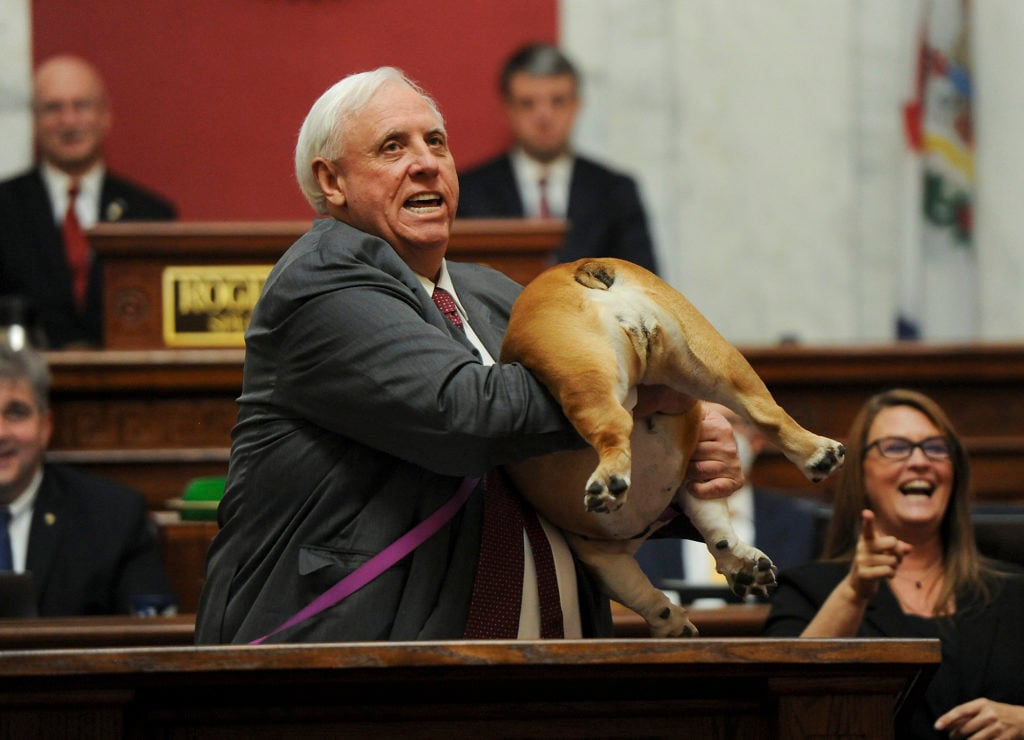
About six months into the vaccine campaign came Babydog’s iconic moment, which placed her in the firmament of American political oddities. The actress Bette Midler had tweeted something ignorant—that West Virginians are “poor, illiterate and strung out”—and the governor saw an opportunity for a stunt. At the end of his annual State of the State address, a trooper handed him his squirming young dog, which he held aloft to the legislature, fuzzy buttocks facing the cameras. Thundering against West Virginia’s critics, he shouted that Babydog wants Bette Midler to “kiss her heinie!” Obviously, this made national news.
Recently, with the unveiling of new murals inside the state capitol’s rotunda, Babydog went viral again. In one painting—a pastoral scene of glassblowing and folk dancing—the governor’s dog lazes on the grass beneath Seneca Rocks. (Apparently, one of Justice’s cabinet secretaries had asked the artist to add her, hoping to insert some wildlife into the scene.) When a local reporter spotted this peculiarity, a minor outcry ensued; Babydog and Justice are synonymous, and the mural was painted at the taxpayers’ expense.
Today, Babydog is a phenomenon—a creature so popular that if Justice shows up without her, the public complains. The two of them are a unit; the big, gregarious governor, tailed by his big, gregarious bulldog. Justice sometimes makes light of their similarity, joking that he and his dog are on the “same dietary program”—one that substantially involves Babydog’s favorite food, Wendy’s chicken nuggets.
On election night, at the press conference outside the mansion, she was dead center before the cameras, atop her folding black camp chair. While Justice spoke—promising to “shake up the world” as a Senator; declaring that, no, he would not put his assets in a blind trust—his dog gazed at him with moony brown eyes, panting sweetly, pearly underbite poking through her jowls. She was eerily poised. In her unruliest moment, a large glob of drool swung from her lips, which the first lady wiped onto a cocktail napkin printed with the gold state seal.
Perhaps I should mention that not all West Virginians are thrilled with Babydog. The issue isn’t the dog herself, it’s what she might imply about the state: that West Virginia is backward, that its people are provincial and uninformed. A few political types used words like “cornpone” and “sideshow,” fretting that Babydog had become an embarrassment, and that I—a member of the coastal media—might sneer. One admitted to a certain “Babydog fatigue.” Another, upon hearing the subject of my story, grew ashen and shook his head.
On Election Day, I stood outside Charleston’s Piedmont Elementary, in a neighborhood of rambling brick homes, hoping to speak with some primary voters. “That dog could have found a better owner,” said a grizzled white man in a Steelers cap, a retired contractor who’s “voting Democrat all the way.” A man in a motorized wheelchair called Babydog a “gimmick.” He said he likes her but he won’t be voting for the governor, due to his concerns about the treatment of workers in Justice’s mines.
Charleston voters are not who Babydog is for, exactly—they’re urban, Democratic-leaning, politically engaged—but everyone I stopped said they knew her, all said they liked her, and none admitted to being under her sway. A youngish white woman, who often sees Babydog on the news, said that loving his dog makes Justice look “a little softer as a person.” When I asked a Black woman in business garb if she cared at all about the existence of the First Dog of West Virginia, she gave me a flat no.
But that’s not the prevailing mood in the state.
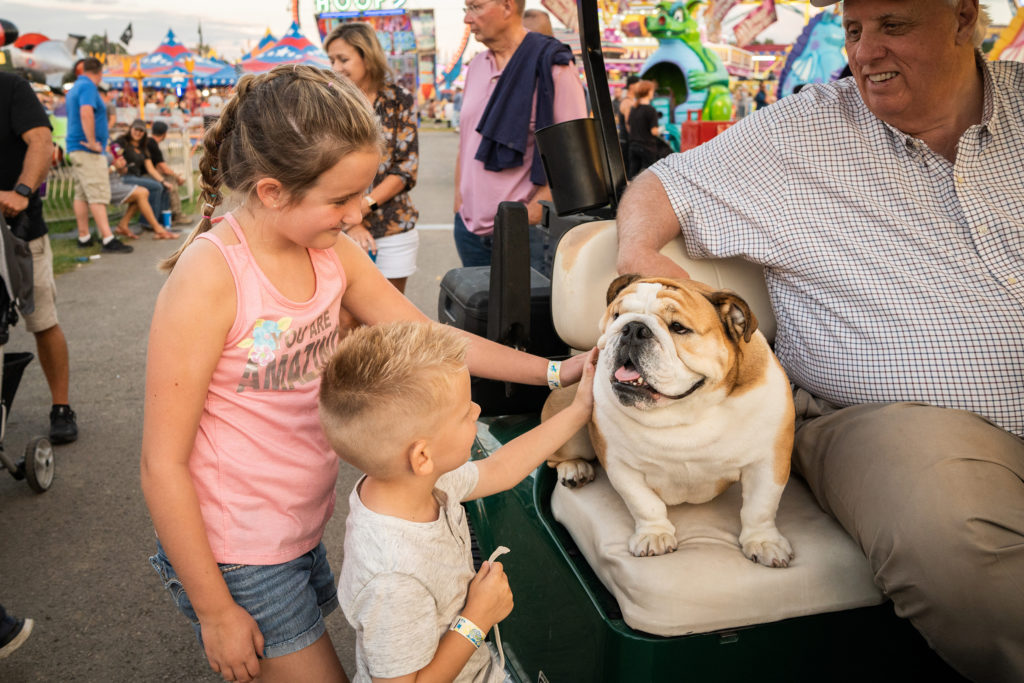
Say Jim Justice is at a school, presenting an oversize check to administrators. Here’s how the event typically goes: The governor ambles onto the floor of the gym, and the schoolchildren clap politely. Justice will say something like “I know you’re happy to see the governor. But tell me the truth: Would you rather see Babydog or would you rather see me?” The schoolchildren scream “Babydog!” and a state trooper hauls her out. The room melts down, the children a puddle of shrieks. Babydog seems unfazed. The governor will briefly speak—with Babydog beside him, on her fur-covered camp chair or in her bright-yellow utility wagon—then everyone lines up for selfies with the dog.
“Today I was at a coal mine,” Justice told me by phone the night before his primary, “and the guys are sitting there in their safety coveralls, coal dust all over them, and after we were done, here they came—all kinds of them—wanting to get a picture with Babydog.” Apparently, an older guy told Justice that his wife wouldn’t let him in the house if he missed the chance to get a picture with the dog. The governor didn’t buy it: “He’s just saying that as an excuse, because he wants to come and see Babydog. They do this all the time, it’s kind of funny.”
Justice is not exaggerating the ubiquity of the Babydog selfie, a genre of image that litters social-media feeds across the state. Legislators, reporters, veterans, construction workers—everyone wants their picture with the dog. And to do so, each of them must attend a Jim Justice event. This is a boon to the governor. Babydog gets people in the door, and he can unspool his message from there.
In 2022, for instance, Justice wanted to cut income tax—but first, voters needed to reject a competing proposal. To convince the public, he and Babydog barnstormed the state, hosting a series of town halls. Justice insists that Babydog’s effect on turnout was “not much” (and that she did not therefore affect tax policy), but Brad McElhinny, a state-government reporter for WV MetroNews, remembers her drawing a crowd. At the events, McElhinny said, the governor spoke briefly about policy, then his “closing argument” was to bring everyone up to meet Babydog. “Justice’s position won the day,” he said, “and the secret weapon was his dog.”
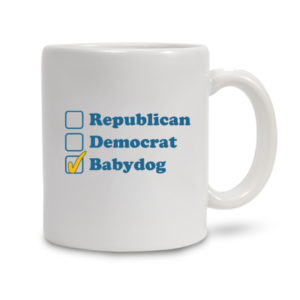
This primary cycle, Babydog has blanketed West Virginia; she’s on news clips, yard signs, social-media posts, and in the oodles of campaign ads that have played, relentlessly, on TV. Some of those ads are Justice’s, but Babydog also appears in one for Moore Capito—son of Senator Shelley Moore Capito—who was Justice’s pick to succeed him as governor. Apparently, the Capito campaign specifically asked for Babydog’s endorsement. “Officially, at this time, Babydog is endorsing Moore Capito,” Justice proclaimed on television, chuckling and steering her paw to high-five his friend.
Babydog is so popular, Bill Bissett told me, that “somewhere, in a conference room with a whiteboard, there has been a very serious conversation on how to counterprogram her.” The result ran in late April: an attack ad, aired by Justice’s primary opponent, featuring a Babydog look-alike. “I know I shouldn’t bite the hand that feeds me,” says a brown-and-white bulldog, “but if you think Jim Justice is conservative, you’re barking up the wrong tree.” The implication is that Babydog—the governor’s shadow, his confidante—knows things about him that make her quail.
On the question of whether these gambits were serious, the answer appears to be “kind of.” Mark Blankenship, a local Republican pollster, said there isn’t direct evidence that Babydog helped Capito—his numbers were already trending upward, though he ultimately lost his race—and the attack ad didn’t move the needle. But he thinks both made sense to try; Babydog commands the state’s attention, which gives her some amount of sway.
The day before the primary, I had coffee in downtown Charleston with a former Democratic operative. He didn’t want to be named, but he said Babydog was working. When people are heading to vote, a candidate wants to be top-of-mind—and “when you’ve seen Babydog all over everywhere, you’re thinking about the governor.” In the end, “there’s a not-insignificant number of people that are going to vote for Jim Justice tomorrow because of the dog.”
It was the first lady’s chief of staff who suggested that Babydog should go out; throughout election night, she’d been snacking from people’s hands—pieces of chicken and shrimp, scraps of pimiento grilled cheese—then ambling over to her water bowl to drink. I offered to take her, but the governor said no. “There’s a process,” he explained, and when I asked what that process was, he said “Drew.”
Captain Drew Pendleton—the state trooper in the gray checked suit, the head of Justice’s security detail—emerged, at that moment, from a corner. “Oh, Drew, you want to airlift her?” Justice said, then introduced him to me as the “keeper of Babydog.”
“Run, Baby, run!” Justice joked as Pendleton crouched to lift her.
While he pulled himself upright, Pendleton’s voice strained: “Come on, Baby—good God.”
“Is she hard to lift?” I asked.
“Do you like lifting concrete?”
Outside the mansion, a thick rain fell, and the trooper tenderly deposited Babydog onto the grass. She immediately peed. “Come on, Baby,” he called while walking toward the fence, but there she remained, still and morose, rain beating down on her back. Resigned, Pendleton grabbed her and lugged her back inside. Her hip is bad, he explained; it’s why she looks a little seasick when she walks.
Come January, assuming the governor decamps for DC, Babydog’s role may shrink. Currently, she’s almost always with Justice: beside his desk at the statehouse, onstage at political events, in the bleachers for basketball practice, in a turkey blind while he hunts. But that may not be possible in Washington, where dogs are not allowed on the Senate floor.
Staffing may also be a hindrance. Now the governor’s protective detail lugs Babydog around; they push her wagon, lift her in and out of her camp chair, and haul her to and from the car. (Protecting the governor is “one of the bigger assignments in the state police,” a former Democratic operative groused, “and I hate to see that they’re dog-sitting.”) But as a senator, Justice won’t be provided a detail, so Babydog may not be able to get around.
“Hopefully, she’ll be able to come to DC with me,” Justice replied, vaguely, when I asked about Babydog’s future. “I hope she’ll be able to come to my office. I’m sure she’ll come around when she can.” This was shockingly noncommittal for a man who has called Babydog a “gift from God,” whose entire life and persona are intertwined with her. Mike Plante, the Democratic strategist, recoiled when I relayed this news; “Nobody puts Babydog in a corner,” he quipped.
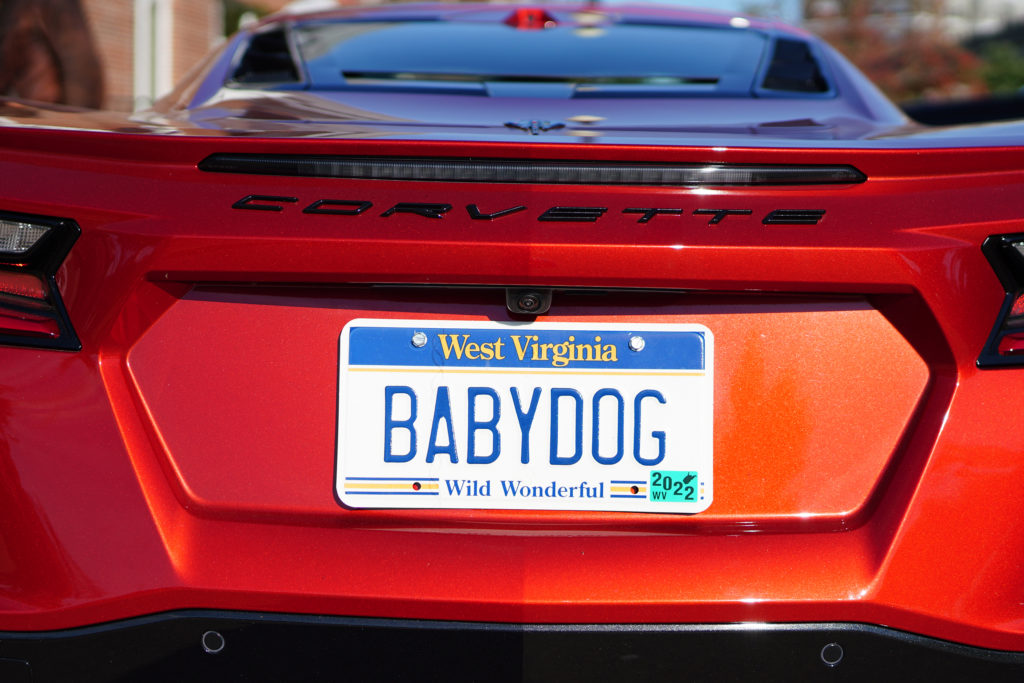
On election night, though, Babydog was still in the limelight, snoozing on the carpet between the governor and his wife. An assortment of Babydog baubles surrounded us: a bulldog statuette on a side table, a “Babydog” license plate on the windowsill, a “Welcome Babydog” sign propped by the TV. Upstairs, in the private residence, hung multiple paintings of Babydog. And on everyone’s plates—beside the charcuterie and deviled eggs—sat fluffy blue-and-yellow sugar cookies that were frosted, somehow, with no fewer than ten different images of Babydog’s face.
As the night wound down and guests trickled from the mansion, only core friends and staffers remained. Ties had been loosened, drinks a quarter full, when someone mentioned a Covid briefing—a notorious one—when an audio glitch made it sound like the governor swore. Laughing, Justice told his comms guy to find the video on his phone, and instead the aide began searching it on the big monitor in the corner of the room. “Oh, we don’t need to put it on there!” Justice cried. “Who’s doing that? No!” The crowd began clamoring for the video. “Look at y’all—you’re like piranhas,” he said.
This launched the evening’s final phase, when the governor’s staff regaled him with videos, including the State of the State address where he exhibited Babydog’s hindquarters; a fan-made compilation of Justice-isms from his Covid briefings, set to the Bruce Hornsby song “The Way It Is”; a rap song about Do It for Babydog; and a Bette Midler music video superimposed with images of Babydog, her face in all the picture frames, her squat body flying on angel wings over the state capitol’s gold dome.
As these videos played, the governor’s face turned scarlet. Sometimes, he’d cover his eyes, say “Oh, Lord,” and take deep, preoccupied sips from his Diet Coke. At one point—right after “kiss her heinie”—he and I exchanged a look; he shook his head at me, bashful but happy, then reached one arm above his head to grip the top of his chair, as though he needed to brace himself for what more might come. Throughout this, Babydog panted placidly on the carpet, her back legs extended like a frog’s. “She’s got her kickstand out,” the governor said.
As Justice sank deeper into the armchair and Babydog’s face drooped toward the rug, I reviewed my notebook with something like shame. I’d just spent three hours beside the governor of West Virginia—a man on a glide path to the United States Senate—learning that his dog doesn’t like celery, that she loves water but can’t swim, that she waits for the governor outside the shower every morning, that it’s a struggle to keep her under 62 pounds. I hadn’t asked about his plans as a senator, or his labyrinthine business dealings, or the pervasive critique that he’s absent during the state’s legislative session because it conflicts with his basketball coaching.
The only remotely difficult question I’d asked West Virginia’s most powerful man was whether Babydog was—as various Democrats had charged—a distraction from more serious matters. He’d bristled, then replied that there are only about seven Democrats left in the state, so he wasn’t going to worry too much about them.
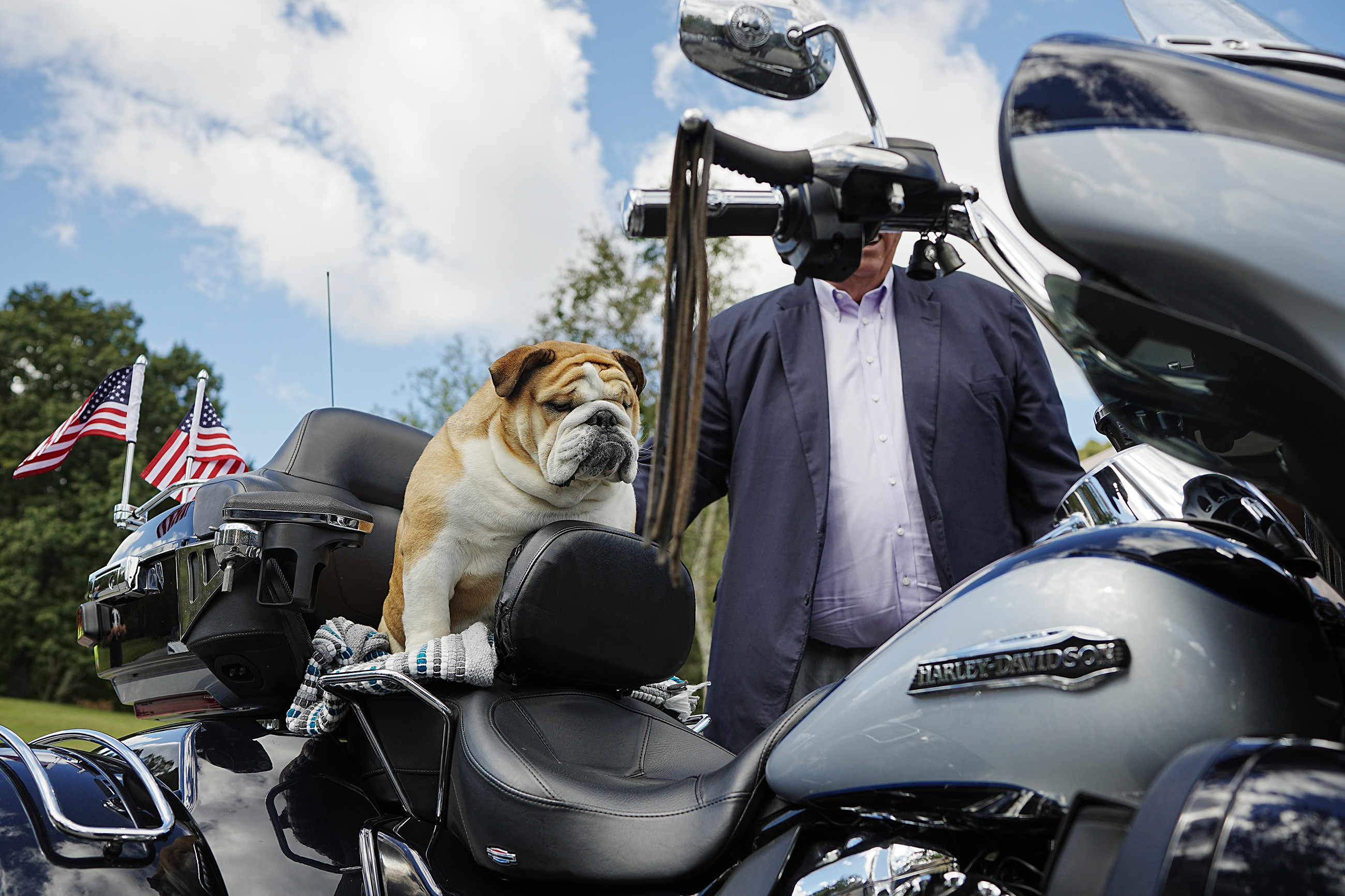
“I’ve got to go because y’all are crazy, and this is getting worse by the minute,” Justice finally told the room, wrenching himself to his feet. It was 11 pm, he’d just won his Senate primary, and he had to drive Babydog home to Lewisburg.
“Goodnight, Governor,” an aide said.
“Senator,” another corrected.
“God bless all of you,” Justice said. “Come on, Baby.”
As the governor shambled out the door, Babydog tailing behind, I clutched my list of unasked questions. She got me, I realized. Babydog had done her job.
This article appears in the July 2024 issue of Washingtonian.
